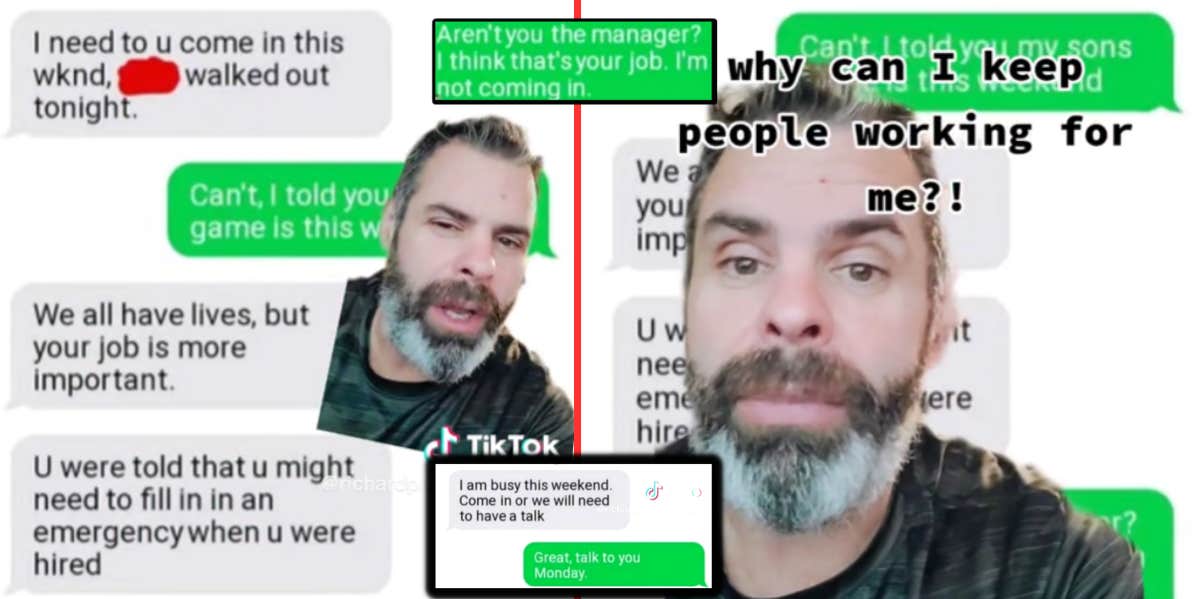Boss Tells Worker 'We All Have Lives But Your Job Is More Important' After They Refuse To Cover A Shift Because Their Son's Game Is On
The boss also had plans of his own, but they were too important to cancel.
 @richtherecruiter/TikTok
@richtherecruiter/TikTok One of the biggest issues plaguing the workplace today is a misalignment between employees and employers. While workers are looking for work-life balance, companies would ideally love for them to be at their beck and call, ready to spring into action whenever needed.
But rarely does a boss tell an employee straight up that the job supersedes whatever they have going on in their personal life. It happened to an employee who reached out to Reddit's "r/antiwork" subreddit for advice. His story was shared by TikToker named "Rich the Recruiter" who laid out the details.
The boss told his employee that his job is more important than his son's game.
The TikToker introduced the greenscreen clip as “The internet’s favorite game, ‘Why can’t I keep people working for me?’” The post started with the person asking, “Do you think I can actually get fired for this?” before sharing a text message thread between themself and the boss. Rich pre-emptively said he didn’t think so but wanted to dive into the correspondence to confirm.
The boss first told the employee they were needed at work because another worker had walked off the job, presumably quitting. The employee replied, “Can’t. Told you my son’s game is this weekend.”
Instead of being understanding of the person’s need to be there for their child, the manager shot back, saying, “We all have lives, but your job is more important. You were told that you might need to fill in in an emergency when you were hired.”
The messages aren’t time stamped so it’s unknown how long it took the employee to respond to that aggressive and dismissive message, but it’s not hard to conceive they need a moment to regain their composure. When they did respond, they told the manager that dealing with emergencies was not their job and reiterated that they would not be coming in that day.
The conversation should have ended there but the manager couldn’t seem to leave well enough alone. Stunningly, they said, “I am busy this weekend. Come in or we will need to have a talk,” to with the employee replied, “Great, talk to you Monday.”
The irony that the canceling manager’s plans were not up for discussion was not lost on viewers.
One person commented, “See if my manager said he's busy that weekend I'd use his 'we all have lives' line right back at him.” A quick review of the comments shows that the boss’s behavior is much more common than you might think.
Employees work about 260 days (2080) per year, and that is when you don’t consider overtime. Of those 260 days, they use an average of 20 days of paid time off (PTO), just 7% of the time they are scheduled to work. That downtime is vital to the physical and mental health, overall well-being, and motivation of employees. It can help reduce the chances of burnout, boost their happiness, and enhance their familial relationships.
Disrupting PTO and adding the threat of discipline when employees stand their ground does everyone a disservice. In addition to tarnishing the relationship, destroying trust, and creating a hostile work environment, it will definitely decrease morale and likely have you looking for permanent coverage for their role when they exit the company.
Instead of demanding employees show up on their days, off, businesses should have a backup plan in place that includes cross-training of existing employees and a database of temporary people to help out. In addition, developing a voluntary overtime sign-up system can work wonders for ensuring that the people who show up to work on short notice are employees that actually want to be there.
Unfortunately for the manager, he or she has made threats that they will likely be unable to back up. If they do try to reprimand or retaliate against the employee for taking a pre-planned day off, the repercussions to the business could be detrimental.
NyRee Ausler is a writer and author from Seattle. She covers issues navigating the workplace using the experience garnered over two decades of working in Human Resources & Diversity, Equity, and Inclusion.

